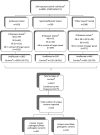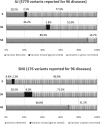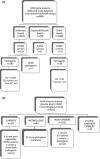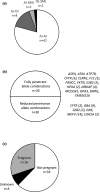Lessons learned from expanded reproductive carrier screening in self-reported Ashkenazi, Sephardi, and Mizrahi Jewish patients
- PMID: 31880409
- PMCID: PMC7005669
- DOI: 10.1002/mgg3.1053
Lessons learned from expanded reproductive carrier screening in self-reported Ashkenazi, Sephardi, and Mizrahi Jewish patients
Abstract
Background: Next-generation sequencing (NGS)-based panels have gained traction as a strategy for reproductive carrier screening. Their value for screening Ashkenazi Jewish (AJ) individuals, who have benefited greatly from population-wide targeted testing, as well as Sephardi/Mizrahi Jewish (SMJ) individuals (an underserved population), has not been fully explored.
Methods: The clinical utilization by 6,805 self-reported Jewish individuals of an expanded NGS panel, along with several ancillary assays, was assessed retrospectively. Data were extracted for a subset of 96 diseases that, during the panel design phase, were classified as being AJ-, SMJ-, or pan-Jewish/pan-ethnic-relevant.
Results: 64.6% of individuals were identified as carriers of one or more of these 96 diseases. Over 80% of the reported variants would have been missed by following recommended AJ screening guidelines. 10.7% of variants reported for AJs were in "SMJ-relevant genes," and 31.2% reported for SMJs were in "AJ-relevant genes." Roughly 2.5% of individuals carried a novel, likely pathogenic variant. One in 16 linked cohort couples was identified as a carrier couple for at least one of these 96 diseases.
Conclusion: For maximal carrier identification, this study supports using expanded NGS panels for individuals of all Jewish backgrounds. This approach can better empower at-risk couples for reproductive decision making.
Keywords: Ashkenazi Jewish; Sephardi/Mizrahi Jewish; carrier couple; expanded carrier screening; preconception/prenatal genetic testing.
© 2019 Sema4. Molecular Genetics & Genomic Medicine published by Wiley Periodicals, Inc.
Conflict of interest statement
All authors except GA, NSA, MD, and BW are employees of Sema4, a clinical laboratory that performs carrier screening and receives monetary reimbursement for testing services. Sema4 employees are compensated by Sema4, and NSA and BW receive compensation as consultants for Sema4.
Figures




References
MeSH terms
LinkOut - more resources
Full Text Sources
Medical

